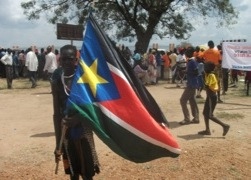
The Montevideo Convention on Rights and Duties of States codifies the four basic elements of statehood in article 1. To be considered a state, the territorial unit must have:
- a permanent population;
- government;
- defined territory;
- capacity to enter into relations with other states.
State failure occurs when the country loses control over one or more of these characteristics. For example, The Fund for Peace, the organization that collaborated with Foreign Policy Magazine to create the “Failed State
Index”, recognizes that the attributes of state failure include:
- demographic pressures and large influxes of refugees and IDPs;
- the inability to provide reasonable public services;
- physical loss of control over territory or the monopoly on the legitimate use of force; and
- the inability to interact with other states as a full member of the international community.
As South Sudan establishes itself as a new nation, it faces both internal and external obstacles in each of these areas that could precipitate state failure. In the next few paragraphs I will analyze how each of these forces could lead to state failure in South Sudan, and what general steps South Sudan will need to take to prevent this.
Alleviating the problems facing its large and vulnerable population is one of the biggest challenges that South Sudan faces. While the exact population of South Sudan remains unknown, it is estimated to be in excess of eight million people. The long history of violence in the region has created enormous instability in the population, and prior to South Sudan’s independence it was estimated that over one half million Sudanese had sought protection as refugees in neighboring African states. A further one and a half million Sudanese had been internally displaced. These population pressures are symptomatic of the violence and poverty of the region. South Sudan is one of the least developed countries in the world, with the worst maternal mortality rate; the highest percentage of children below 13 not attending school; and one of the highest percentages of female illiteracy.
South Sudan’s government will have to work hard to provide public services to this stressed population. The country is larger than Spain and Portugal combined but has less than 100 miles of paved roads. While the region has oil reserves, these reserves are at best a mixed blessing. The government depends on oil for 95% of its revenue, making it extremely susceptible to fluctuations in the value of oil. To avoid becoming a failed state, South Sudan must create infrastructure to support its population. This must include diversifying its economy so the country’s future is not handcuffed to oil. Because state failure is so often characterized by weak government and poor populations, South Sudan’s top priorities will include the establishment of security, basic services, and meaningful work opportunities outside of the oil sector.
State failure is also often accompanied by physical loss of control over territory or the monopoly on the legitimate use of force. Thus, South Sudan must also resolve its territorial disputes with the north and work to control internal violence. The Abyei region, in particular, is one of the most problematic areas for South Sudan. Both Sudan and South Sudan have claims to Abyei, an area that is known to have oil reserves. Despite the fact that both sides accepted an arbitration decision issued from The Permanent Court of Arbitration in The Hague in July 2009, the Abyei boundary is still disputed. Earlier this year, reports of violence in the area led the UN Security Council to approve the deployment of 4,200 Ethiopian peacekeepers for six months. Hopefully, these peacekeeping forces can assist South Sudan to secure a long term solution to these territorial disputes. Securing a long term agreement between the north and the south over the resources on the border will be an essential step towards preventing state failure.
A further indicator of state failure is an inability to interact with other states on as a full member of the international community. South Sudan’s entry into the United Nations is the first step towards solidifying international recognition. To promote development, South Sudan will need to further develop international ties. For example, South Sudan will probably look to access the resources of International Financial Institutions, secure aid packages, and attract foreign direct investment. The United States, in particular, may play a critical role in facilitating international support. Princeton Lyman, the US’s Special Envoy to Sudan, emphasized this point in his recent testimony before the Senate Foreign Relations committee:
[T]he government of South Sudan will also depend on international support as it seeks to address its many challenges . . . . The United States has provided significant support for South Sudan over the years, and we will remain a steadfast partner as South Sudan seeks to peacefully meet these challenges. The strong ties between our peoples go back many decades, and we want to continue to build on that partnership.
Securing South Sudan’s independence was a major victory for international diplomacy, but significant challenges remain ahead. Continued support is necessary if South Sudan is to develop into a strong state that can act as a leader in the region.
As this brief analysis shows, the characteristics indicating state failure often have a symbiotic relationship. For example, territorial disputes weaken the government and a weak government cannot provide basic services. Therefore, a broad multilateral approach is needed to foster development and prevent collapse.


